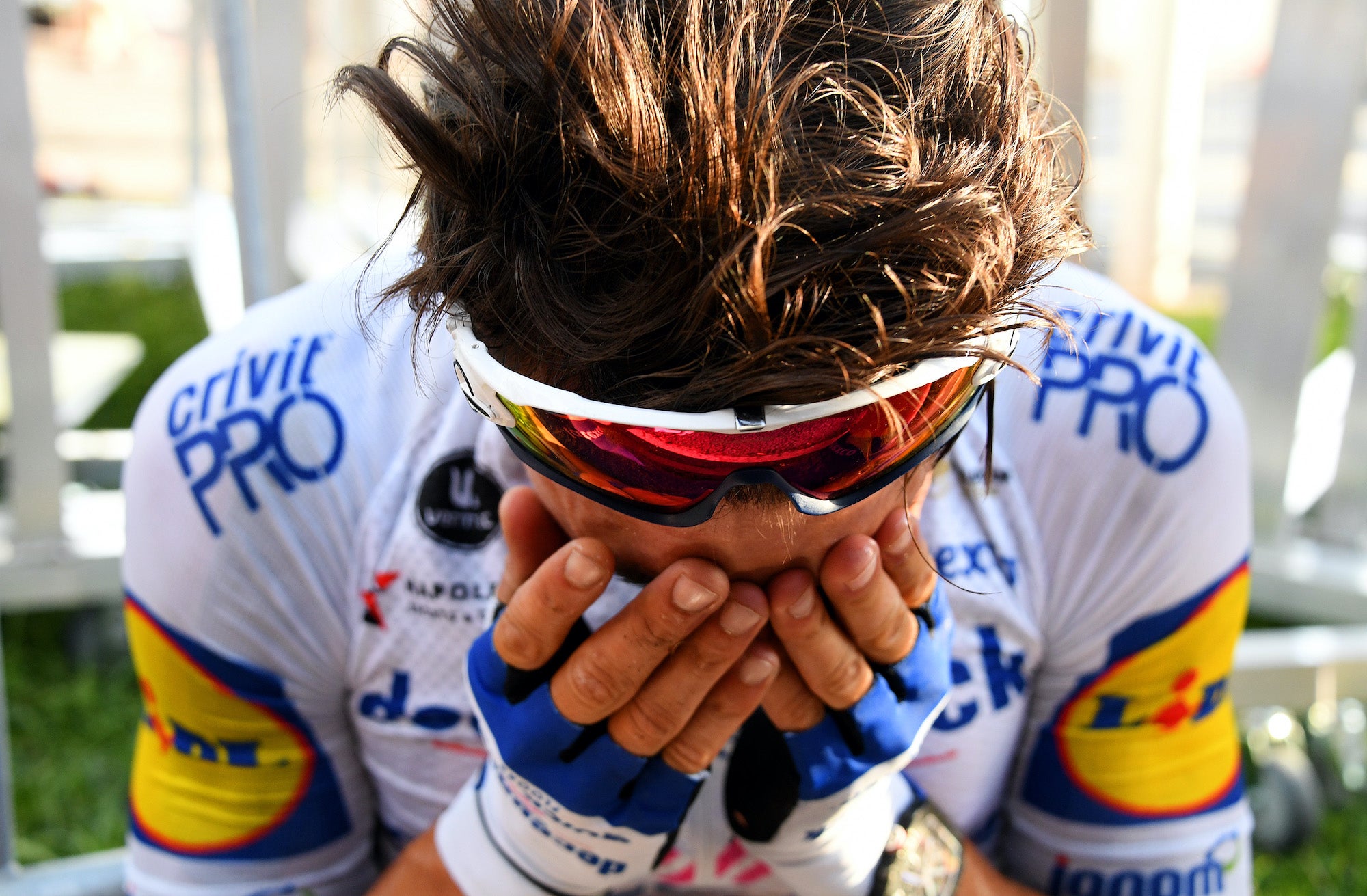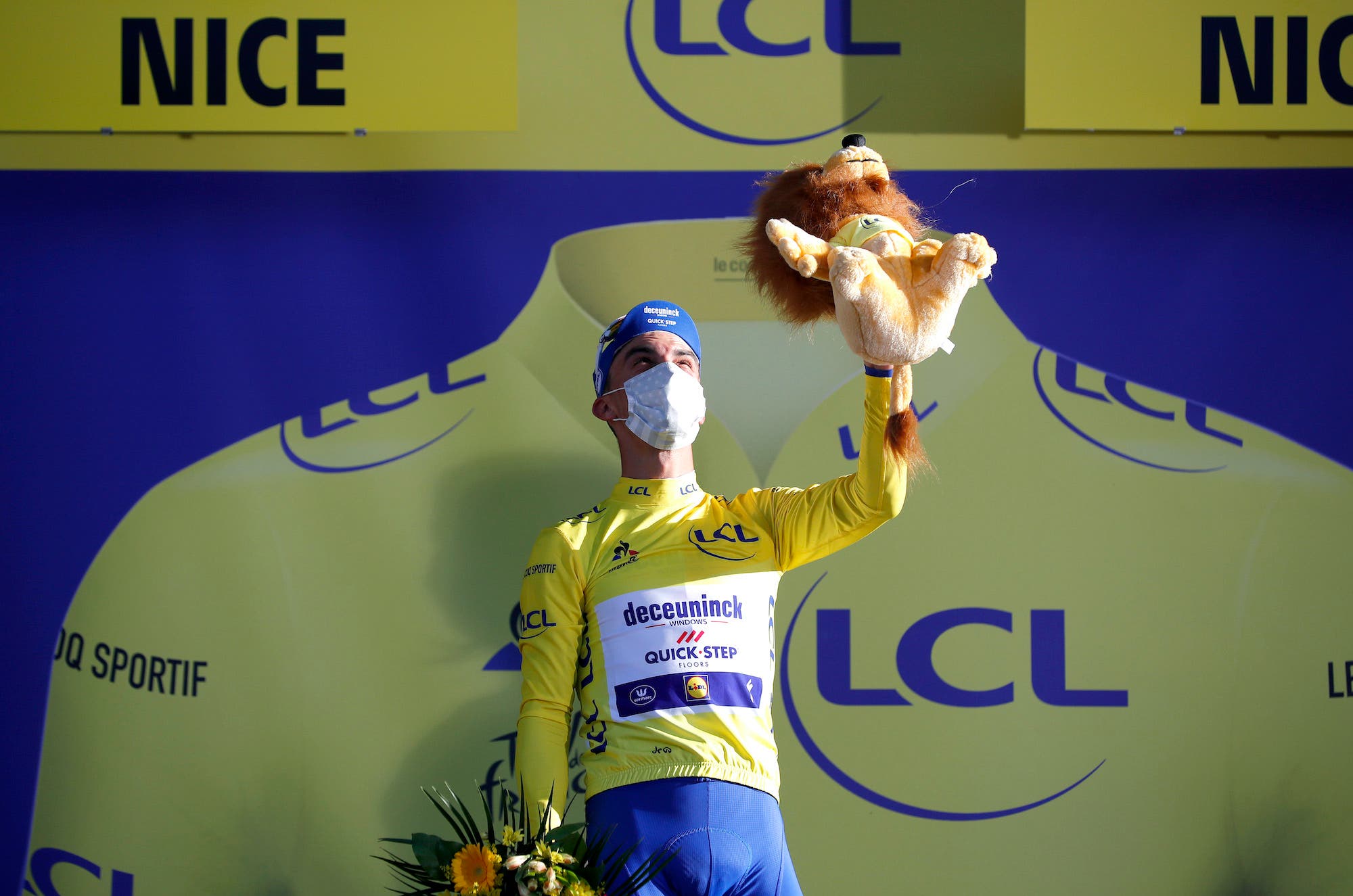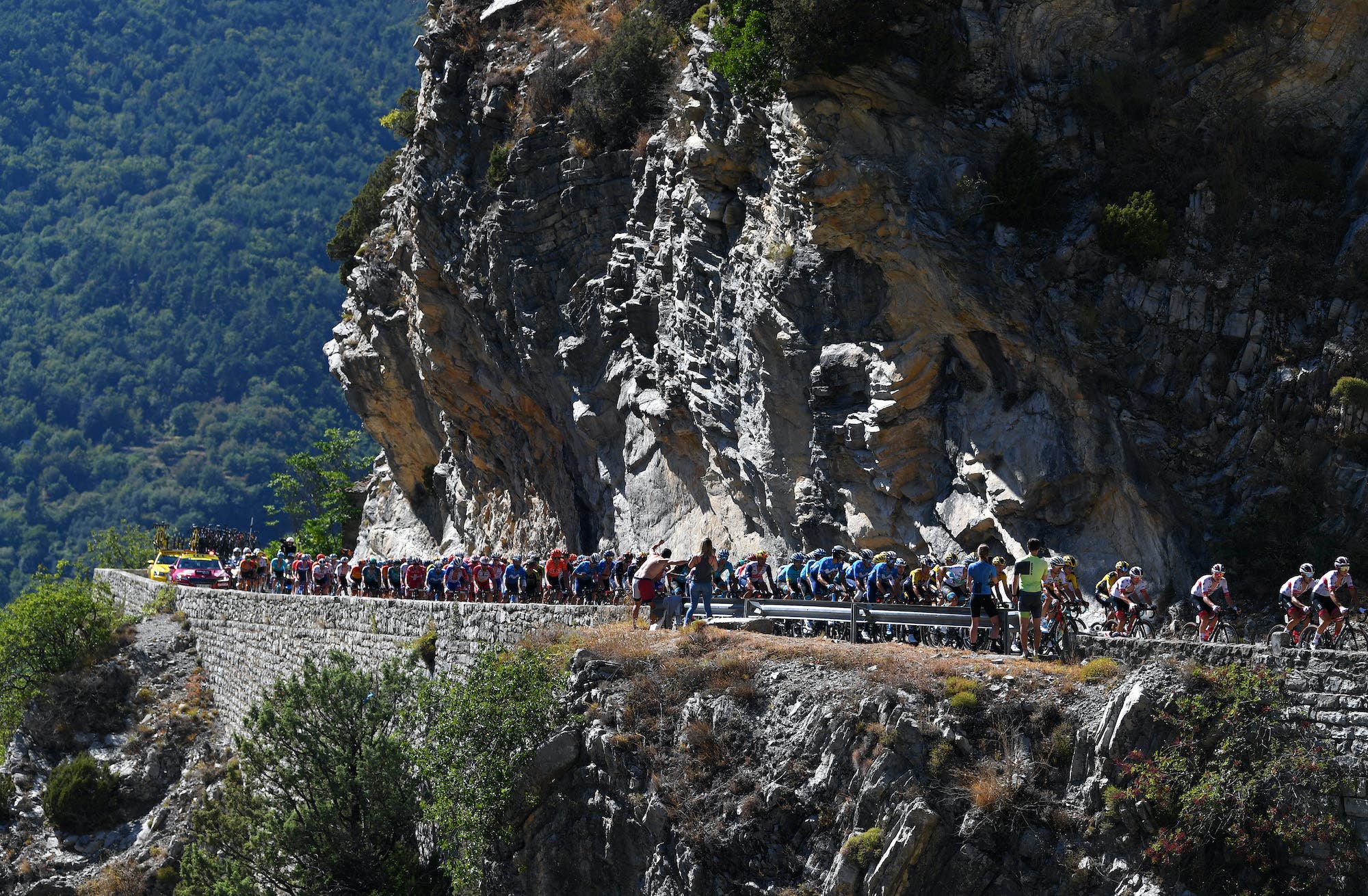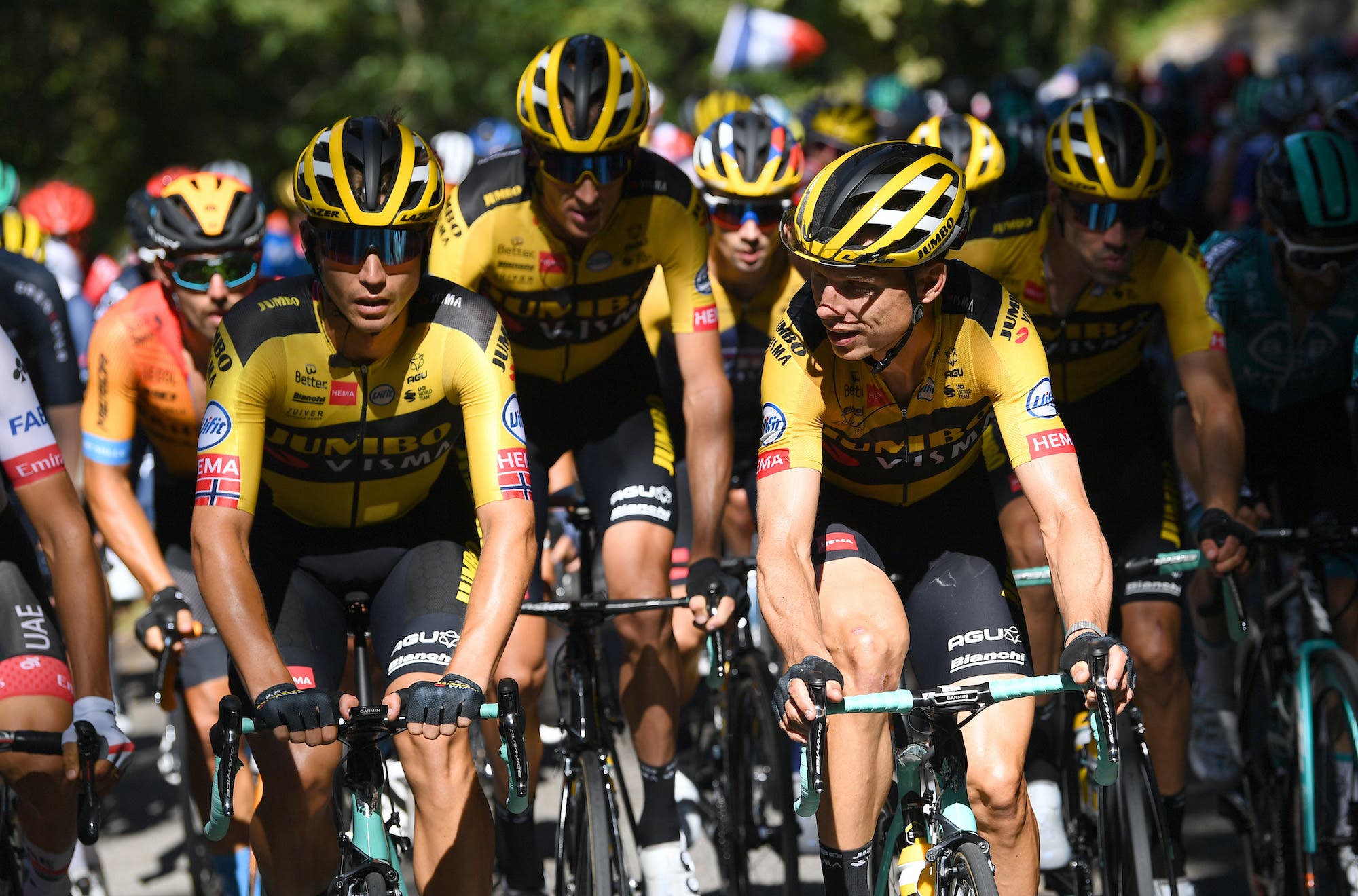Tour de France stage 2 roundtable: Emotional Alaphilippe takes yellow jersey

Julian Alaphilippe. Photo : Stephan Mantey - Pool/Getty Images
Stage 2 of the Tour de France saw Julian Alaphilippe take sprint victory in Nice on Sunday.
The Frenchman not only took his fifth Tour stage but also the race’s overall lead, harkening back to his early grab of the yellow jersey in 2019. An emotional Alaphilippe dedicated the win to his father, who passed away recently, likely embedding him deeper in French hearts.
The stage had played out over an unprecedented early climbing test that put the peloton through nearly 4,000m of climbing, with Jumbo-Visma again playing Ineos and dictating the pace.
How special is it for bike racing, and the French, that Alaphilippe took the stage?
Did the mountains have that much of an impact?
And what’s Jumbo-Visma’s gameplan?
Let’s roundtable!
How good is it for the race, and for French fans, that Alaphilippe takes the yellow jersey after such a difficult opening to the year?

Fred Dreier (@freddreier): I suppose it depends on whether or not you think it’s a good idea for the 2020 Tour de France to continue amid the COVID-19 pandemic. Alaphilippe in yellow is obviously a huge storyline for the Tour de France. There are real and legitimate questions over whether or not the race should continue, and I’m willing to bet there are more than a few critics in France saying that the thing should be called off for public safety. I think that Alaphilippe’s victory and time in yellow will bring more fan attention and more passion to the idea of the race continuing to the end. Cutting the event short, if the entire country is engaged, would be a tough thing to do. So, I think the more attention on Alaphilippe, the more attention on the race and its efforts to reach Paris.
Jim Cotton (@jim_c_1985): No matter what your nationality or your allegiances to a particular team, you can’t help but love Alaphilippe. Seeing him win with his trademark “accelerate over the climb and descend to the line” manoeuver is something we’ve seen him do countless times, and seemed to signal a return to normality. And having him take the yellow jersey so early should revive a French nation after it suffered some of the harshest consequences of the pandemic. For the next few days at least, bike racing is a “thing” again in France.
Dan Cavallari (@browntiedan): In such a strange year, everything matters to a symbolic extent. Alaphilippe’s win was exciting, which I think is more important. The Tour has officially begun, and with fireworks early, it’s great for fans to get sucked into our first Grand Tour since COVID struck down the season. Had the Tour started with a prologue and endlessly long, flat stages, I think that would have been a detriment. With Alaphilippe’s exciting riding style and panache, Stage 2 helped reignite cycling officially.
Do you think the unusually early mountains had much of an effect on the race?

Jim: The opening two cat 1 climbs did nothing for the racing on the day, with it all boiling down to that final kicker in the closing 15km. However, those big climbs will serve as an early load in the legs that will get the fatigue setting in early. With a flat stage Monday then another mountain stage, riders aren’t being offered an opportunity to snooze through the opening week, which all adds to the tension and potential for shakeups.
Dan: Absolutely. Again, having the exciting fireworks early is a boon for the Tour. Even the chaotic first stage, with all its crashes, was enough to get the cycling juices flowing for fans. Following that up with the climbs, and an exciting sprint finish with a Frenchman taking yellow, makes for a perfect early narrative.
Fred: Yes, I think that the big mountains today forced a few teams to burn some matches earlier than they would have liked. Specifically, UAE-Team Emirates and Jumbo-Visma put out a lot of effort today — maybe even too much. Jumbo-Visma had Robert Gesink empty the tank on the penultimate climb, and it showed on the Col du Quatre Chemins, when the team disintegrated under Alaphilippe’s attacks. The question is whether or not that early effort today will impact things in weeks two or three.
Jumbo-Visma again assumed responsibility for controlling the bunch as Ineos Grenadiers sat on behind – is this indicative of the shift of power in the peloton? Or just a statement of intent from Jumbo-Visma?

Fred: Honestly, I think it’s youthful overexuberance by Jumbo-Visma. While it may feel good to power to the front of the peloton and put Team Ineos Grenadiers in your wake, putting out that much energy on stage 2 could be a bad strategic move. Team Ineos Grenadiers is the proverbial New England Patriots of the peloton. Sometimes it’s best to watch what they are doing and then follow suit, because they’ve been there and done that a million times before! I think it may have been wiser for Jumbo-Visma to cool its jets today.
Jim: While it doesn’t suggest a shift of power, it was a clear display of intent – Jumbo-Visma wants to win, and thinks it has the cajones to do it. However, they could have left more of the work to Ineos Grenadiers and UAE-Team Emirates, who also kept close to the front. Like at the Dauphiné, there’s a sense Jumbo-Visma is relishing its role as a favorite and keen to give it some chest-beating at the front. However, the Dauphiné was five stages, the Tour is 21. They need to remember it’s a marathon, not a sprint.
Dan: It certainly appears so, but you can never really tell with Ineos. The team is adept at sitting quietly and observing for a very, very long time. Jumbo-Visma is sending the louder message here, letting the peloton know it has the muscle to control the race. Remember, last year Bernal didn’t take yellow until very late in the race. With climbing stages happening earlier and more often this year, I think we’ll see the battle heat up quickly. Today seemed like an exercise in sizing each other up.